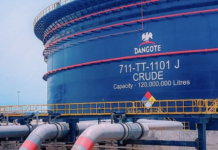Road Transport owners across Nigeria have expressed optimism that the 650,000 barrels-per-day Dangote Petroleum Refinery would deepen the downstream sector and positively impact their businesses.
The transporters, under the aegis of Nigerian Association of Road Transport Owners (NARTO) after a guided tour of the refinery Plant in Ibeju-Lekki area of Lagos, said they had no doubt that the project would generally accelerate the development of Nigeria’s oil and gas sector; just as they also expressed the willingness to play a good role in the distribution of refined products from Dangote refinery when it starts operations.
The NARTO leaders commended the President of Dangote Industries Limited, Aliko Dangote for his huge investment in petroleum refining and making the country one of the potential top refiners of petroleum in the world.
Speaking after a tour of the refinery project, President of NARTO, Alhaji Lawal Yusuf Othman, described Aliko Dangote as a trailblazer in the nation’s industrial development, whose contributions to economic development of the nation have helped in reducing unemployment and alleviating poverty.
Othman expressed satisfaction over the quality of construction materials being used for the refinery, saying; “We are impressed with the massive project which has been regarded as the largest single train refinery in the world. The quality of the machines, the size of the refinery, and the quality of the work is of international standard. We are also very happy that there is a plan to construct the road from the refinery down to around Ijebu-Ode. The road construction is going to decongest the roads and make it easy for us to do our business,” he added.
To encourage more players in the downstream sector, the NARTO President emphasized the need for government to deregulate the downstream oil and gas sector fast.
“Many people are not refining because the sector is still regulated. It is difficult to invest billions of dollars into a sector, where prices are determined by government. Deregulation will encourage more players into the downstream sector. When there is full deregulation, government does not need to force anybody to invest in the sector. Deregulation will attract foreign and local investment in the sector,” he added.
Othman said members of NARTO have been given the necessary assurance that their businesses are going to be protected when the refinery comes on-stream under the Petroleum Industry Act.
He stated, “We came on a tour of Dangote Refinery to assess the level of construction work going on at the site and also to reassure our members that the refinery is going to have positive impact on their business, most especially with the signing into law of the Petroleum Industry Bill (PIB).
“It is expected that there is going to be full deregulation of Nigeria’s downstream oil and gas sector. At the same time, we hope in the coming months, the Dangote Refinery will come into operation.
“As at today, imported petroleum product is distributed across the country through road by our members. We thought that now that Dangote Refinery is coming on stream, the company might be interested in self-distribution of the products across the country without involving us. However, we have been told that the products will be distributed through the depots. So, we will partner Dangote refinery for ease of products distribution across the country
“We have been assured that 70 per cent of the refined products will be transported through the sea, while 30 per cent will be by trucking. Although, the company has a gantry with a loading capacity of about 2,000 trucks per day, we have been assured that Dangote does not have interest in the retail of petroleum products.
“We are certain beyond reasonable doubt that our businesses are going to continue in the downstream sector. Of course, Dangote Refinery is going to produce and distribute through the sea and allow those of us who are into retailing to continue with our business. Now, most of our members have the fear that Dangote may go into retailing and distribution of products,” he added.






